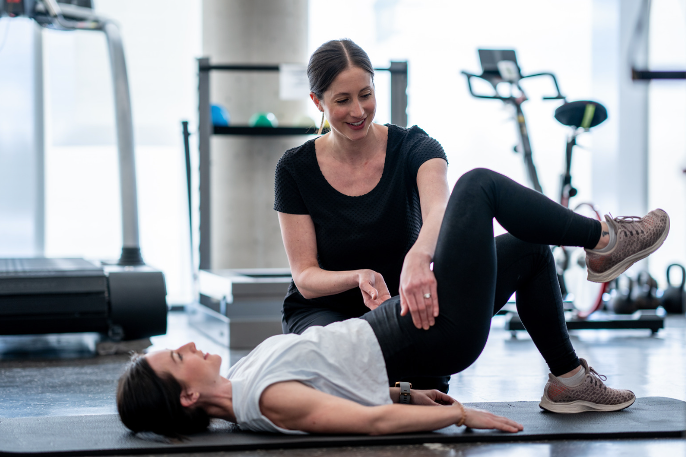The Importance of Wellbeing When Returning to Work: An Osteoarthritis Story
Meet Kelly*, a vibrant and active individual who was confronted with the challenges of osteoarthritis. Experience Kelly’s transformative wellbeing journey, as she transcends her initial belief of work being unattainable, all the way to embarking on a proactive job-seeking mission.
Five Underrated Benefits of Exercise
We all know the big benefits of exercise, we’ve heard them all before. But what if we told you that exercise offers additional benefits...
Benefits that could deem your afternoon coffee forfeit, help you nail your next project at work, or even enable you to finally stick to that morning routine you’ve been striving for?
That’s exactly what we’re looking to do in this week's blog. Read it now for a fresh dose of inspiration!
What is “Wellbeing”?
The wellness industry worldwide is set to reach a value of 7 trillion dollars in 2025…
But so many of us are still confused about what actually makes up wellbeing!
Read this weeks blog to gain more insight and learn what we are aiming to do when focusing on the wellbeing of our customers.
The Mobile Advantage in Exercise Physiology
At Specialised Health, we have been providing mobile exercise physiology services since our inception in 2013.
Quite simply, having Exercise Physiologists who are mobile improves client outcomes.
Let us explain why!
Fatigue in the Workplace - Part 2: Our Top 5 Strategies for Employers to Navigate Workplace Fatigue
Many people feel endlessly tired at work, with no idea of how to turn things around…
As an employer you may feel helpless.
But, there are things you can do beyond the endless coffee supply!
Start by checking out our five strategies for employers, to mitigate workplace fatigue.
Fatigue in the Workplace - Part 1: How to Spot It and Why It's Important
In today's fast-paced and increasingly complex world, fatigue has become an all too familiar companion. It should be no surprise then, that it’s a big deal in the workplace…
So how do you spot a worker struggling with fatigue? And why is it so important to do so?
Read this week's blog to find out!
The Bounce Program: Feedback from our Participants
Whose voices matter the most in the realm of fatigue management?
Those who are experiencing fatigue of course.
That’s why we asked them what they think of our fatigue management approach.
Read this week's blog to find out what they had to say!
Heart Rate Variability (HRV) in Fatigue Management: A peek into the research
We’ve been using HRV in the fatigue space for a long time now, so we know it works.
But just to make sure, and to further convince any sceptics, we thought we would
check in with the research as of 2023. . .
Is our confidence warranted? Read now to find out!
Breaking the Chains of Chronic Pain: Part 2 - The Psychological Benefits of Exercise
Have you ever experienced the psychological implications of chronic pain?
In part two of our 'Breaking the Chains of Chronic Pain series', we explore some of the psychological benefits of exercise we see when working in the chronic pain space.
Discover how it can help reduce fear, stress, and uncertainty around pain, and empower your customers to take an active role in their pain management.
Understanding Fibromyalgia: Insights and Ways to Help
Do you know what it's like to live with fibromyalgia?
A condition that affects approximately 3-5% of Australians, yet is widely misunderstood.
As exercise physiologists, we've seen firsthand the challenges faced by those living with fibromyalgia. That's why we're on a mission to help educate people on what this condition is and how you can support those who are dealing with it.
Breaking The Chains of Chronic Pain - Part 1: Physiological Benefits of Exercise
We've seen firsthand how exercise can be a game-changer in managing chronic pain.
In this week's blog, we share some of the physiological ways that exercise can help alleviate chronic pain. From improved blood flow and natural painkillers to decreased nervous system sensitivity and improved joint lubrication.
But we don't want you to keep this valuable information to yourself. Share this blog with anyone who needs it, and let's empower more people to take that next step forward in their chronic pain journey.
No Gym? No Problem! - Why We Love Taking Exercise Physiology Outdoors
Outdoor exercise has become a favourite pastime for many, and for good reason.
From mental well-being to sustainability, our latest blog post shares our top three reasons for taking EP sessions outdoors.
Read on to learn how you (and your customers!) can benefit from exercising in the great outdoors.
5 Reasons You Should Exercise As You Age
As the world's population ages, exercise physiology is becoming increasingly important for maintaining function and well-being.
Here are 5 reasons why you should exercise as you age, including maintaining muscle mass, preventing falls, managing pain, improving social connections, and promoting overall health and well-being.
Exercise is a long-term investment in your function and independence, so start investing now!
Integrating Social Connection Into Exercise Physiology
Social interaction is a critical aspect of mental health and well-being, but in today's fast-paced world, it's easy to feel isolated and disconnected.
At Specialised Health, we integrate social interaction into our exercise physiology programs to promote better mental health outcomes.
Learn more about the benefits of social connection in our latest blog post.
Creating Supportive Workplaces - How to Help Employees Thrive After a Mental Health Claim
Worried about the struggles employees face after a mental health claim? Our latest blog has the answers!
Discover "Creating Supportive Workplaces: How to Help Employees Thrive After a Mental Health Claim."
Join us in the mission to make mental health a top priority in the workplace!
Getting Back to Work and Life - A Breast Cancer Survivor's Success Story with Exercise Physiology
Samantha*, a breast cancer survivor, was struggling with physical and mental exhaustion but with the help of our exercise physiologist, James, she was able to reclaim her independence and vitality.
Check out this heartwarming success story and learn how exercise physiology can make a difference in your life or the life of someone you know.
Building Strong Rapport: Our 5 Essential Factors
The key to creating and facilitating a successful exercise program lies in building and maintaining strong rapport. There is no doubt about it.
A positive and trusting relationship between an exercise physiologist and a client can lead to better outcomes, faster recovery, and an improved outlook regarding physical activity and health status overall.
We pride ourselves in building strong relationships with our clients, so how do we do it?
Exercising with Cancer: Matching ADLs to keep you moving
Exercise is an essential component of cancer care.
However, exercise prescription for cancer patients must be tailored to their individual needs and abilities, including their Activities of Daily Living (ADLs).
By matching gym exercises to ADLs, we ensure that the exercises are functional, relevant, and help cancer patients maintain independence and quality of life.
Check out how we do that in this week's blog.
Exercise as Prevention for Cancer-Related Muscle Loss
Recent research shows that exercise plays a key role in preventing and reducing the impact of cancer related muscle loss, and early intervention is crucial!
Read this week's blog to stay up to date.
Getting In The Zone - How to use heart rate zones to get the most from your workouts
The days of doing endless cardio without purpose are over!
Bring intention and focus to your training sessions this year with heart rate zones.
Calculate your personalised zones and learn how to train in them in this weeks blog.




















